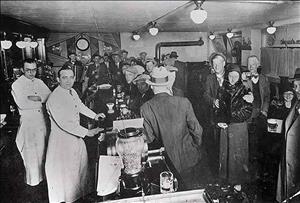On December 5, 1933, the 21st Amendment to the U.S Constitution is ratified, repealing Prohibition. The manufacture, sale, and possession of alcoholic beverages is no longer illegal and the Seattle City Council enacts an emergency ordinance permitting the sale of beer and wine. In the state legislature, a majority supports state-owned liquor stores.
The state of Washington prohibited the manufacture and sale of liquor beginning in 1916. The 18th Amendment to the Constitution and The Volstead Act made Prohibition the law of the land in 1920. Franklin Delano Roosevelt (1881-1945) ran for the presidency in 1932, partly on a platform of the repeal of Prohibition. The 21st Amendment was ratified by the state of Washington on October 3, 1933. On December 5, 1933, Utah was the 36th state to ratify the amendment. President Roosevelt immediately issued a repeal proclamation.
Even before the Utah vote came in, the Seattle City Council prepared an emergency ordinance providing for the sale of beer and wines of up to 16 percent alcohol content. It was approved unanimously and signed immediately by Mayor John F. Dore (1881-1938). Sale was prohibited within two miles of the University of Washington and within 500 feet of any grade or high school. A small section of Madison Park was not included in the University ban because it had been exempted under an old state law. Police Chief L. L. Norton stated that his officers would enforce the ban around the University as soon as the City Engineer determined the boundaries of the dry area.
Beer with an alcohol content of 3.2 percent could be sold in stores, restaurants, and taverns within two miles of the University since it was believed that this was not intoxicating.
Not provided for in the ordinance was the sale of beverages of more than 16 percent alcohol content. The city received a ruling that an old state law would still allow drug stores to sell liquor of all descriptions for medicinal or scientific purposes without a prescription. Some drug stores began to construct elaborate displays. Domestic wine was priced at $1.25 to $1.75 a bottle. Sixteen-year-old whiskey sold for $3.00.
In Vancouver, B.C., an estimated 4.5 million gallons of liquor, mostly bourbon and rye whiskey, were stored in warehouses awaiting official permission to ship to Seattle and San Francisco.
But the first night of legal liquor in Seattle was quiet. A Seattle Post-Intelligencer reporter wrote:
"You walked into a bar on lower 3rd Ave. There were nine people in the place. A venerable bartender stood with folded arms, looking at the wallpaper."Brandy and soda? Yessir. No, the crowd's nothing extra tonight. In fact," he says confidentially, "it's very slow tonight. Must be the rain."

